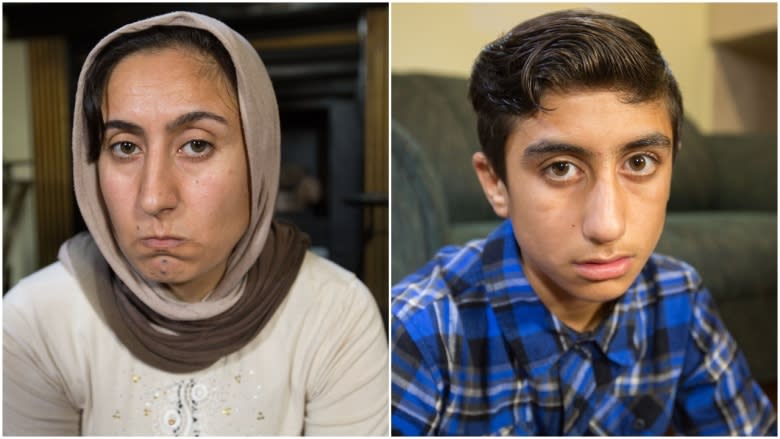Canada 'on track' to resettle 1,200 victims of ISIS genocide, sexual slavery
Canada is on track to resettle 1,200 survivors of ISIS atrocities by year's end, and the vast majority of those who have arrived so far are Yazidis.
Critics have accused the Liberal government of hiding details about the special program.
Immigration Minister Ahmed Hussen recently announced that 800 survivors had been brought to Canada but did not specify at the time how many of them were Yazidi.
According to new information provided to CBC News by Immigration, Refugees and Citizenship Canada, 81 per cent are Yazidi. About 38 per cent have come from Iraq, another 36 per cent from Lebanon and 26 per cent from Turkey.
All remaining arrivals are expected to be from Iraq, and the government is "on track" to meet its commitment, said IRCC spokeswoman Nancy Caron.
"We are continuing to conduct interviews, process applications, arrange for approved applicants to travel to Canada and provide settlement supports upon arrival," she said. "We are continuing to monitor recent political developments in the region and any possible implications this may have on our operation."
Calls to up intake in 2018
As the special operation continues, there are already calls for the government to boost the number next year.
"I believe that we can do more, to increase the numbers from 1,200, which is such a small little number to the size and the measure of the genocide we saw happening to their community," said Majed El Shafie, founder of human rights advocacy group One Free World International. "Increasing the number to 3,000 or 4,000 I think is doable; the Canadian government can do that."
One of the people his organization is helping to resettle is Melkeya, whose last name will not be published to protect Yazidi relatives still in Iraq.
She said she is grateful for the support she has received in Canada but is finding it difficult to live on the monthly allowance of $800.
'We feel safe here'
"We feel safe here, but we want them to help to bring more Yazidis to the country," she said in Arabic through a translator. "We are very thankful to the Canadian government, but even the support that we are receiving from them, it's just enough to pay the rent."
Melkeya told CBC News reporter Makda Ghebreslassie about the horrific experience of being rounded up, held captive and sold by ISIS militants to a man older than her father who beat and raped her.
She said she would "prefer to die than live this kind of life." Melkeya managed to escape with the aid of a smuggler her family had paid $12,000 US.
Her sister-in-law, Basema, said she faced a similar fate: sold seven times and raped repeatedly. Her eldest son was captured and held as a child soldier, forced to convert to Islam. And there were other atrocities.
"I witnessed a girl 10 years old, Yazidi girl, who was raped in front of me," she said, sobbing. "I am 30, I can handle it, but she was 10. She couldn't even sit down from the pain after they raped her."
Winnipeg-based Yazidi advocate Hadji Hesso is also urging the government to play a global leadership role by at least doubling this year's intake to 2,400 next year.
No infrastructure
"To survive in the Middle East is very hard since their entire region has been destroyed," he said. "There is no infrastructure or foundation, never mind the people who have been raped and killed and enslaved."
There is no plan to bring in more Yazidis beyond the current federal program.
"At this time, we are focused on fulfilling our commitment to resettle survivors of [ISIS] including Yazidis. We will not speculate on any future commitments at this time," reads a statement from Hussen's office.
On Oct. 25, 2016, MPs unanimously supported an opposition motion sponsored by Conservative MP and immigration critic Michelle Rempel to bring an unspecified number of Yazidi women and girls to Canada within 120 days. In February, Hussen announced that the target would be 1,200 by the end of 2017.
The Yazidis are a religious minority based mainly in northern Iraq, with a culture dating back 6,000 years. ISIS has targeted them in brutal attacks since August 2014.
Massacre, sexual slavery
Last June, a United Nations report declared that the slaughter, sexual slavery, indoctrination and other crimes committed against the 400,000 Yazidi amounted to genocide. Its finding that the militants had been systematically rounding up Yazidis to "erase their identity" meets the definition under the 1948 UN Convention on Genocide.
Jean-Nicolas Beuze, a representative of the UN's refugee agency in Canada, said every effort should be made to support the Yazidis in Iraq, and only the most vulnerable should be resettled.
"A lot of people choose not to resettle because it's a social and cultural shock to be moved away from your own community when you have regained a little bit of normalcy, safety and access to services in northern Iraq," he told CBC News. "We need to keep the resettlement for extremely vulnerable cases, maintain the choice of the person."
Canada modelled its specialized Yazidi refugee program after the first such project, in the German state of Baden-Wurttemberg. Of the 1,000 survivors in the first phase of that project, an estimated 95 per cent are Yazidis and the other five per cent mostly Christian, spokesperson Christoph Neethen told CBC News.
He said some of the women and children are now living nearly independently and some are working in either paid or volunteer positions. Others rely heavily on supports, including the elderly, who are partially illiterate.



